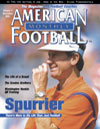Article CategoriesAFM Magazine
|
Scout\'s HonorOne of the least known and loved groups of any organization is its scouts.by: Steve Silverman © More from this issue WORKING IN THE NFL ISN'T ALWAYS ABOUT THE GLORY. Despite working in the richest and most successful league in all of professional sports, there are still a great number of key employees who aren't household names. Yet without them, head coaches, star players and backups couldn't have the degree of preparation that is seen on a weekly basis. Scouts are generally in the game for the love of it. Oh, they get paid for their work, but they don't command the big money made by the players, coaches and other key front-office personnel. Scouts usually get paid in the $50,000-$70,000 range, but part-timers start at $20,000. Good scouting in the NFL is at the core of every orga....The full article can only be seen by subscribers.
|
|
|||||||
| HOME |
MAGAZINE |
SUBSCRIBE | ONLINE COLUMNISTS | COACHING VIDEOS |
Copyright 2025, AmericanFootballMonthly.com
All Rights Reserved





